【单元考点培优】Unit 1 Wise men in history 专题07 句型转换-2025-2026学年九年级英语上册单元复习考点培优沪教牛津版(含答案解析)
文档属性
| 名称 | 【单元考点培优】Unit 1 Wise men in history 专题07 句型转换-2025-2026学年九年级英语上册单元复习考点培优沪教牛津版(含答案解析) | 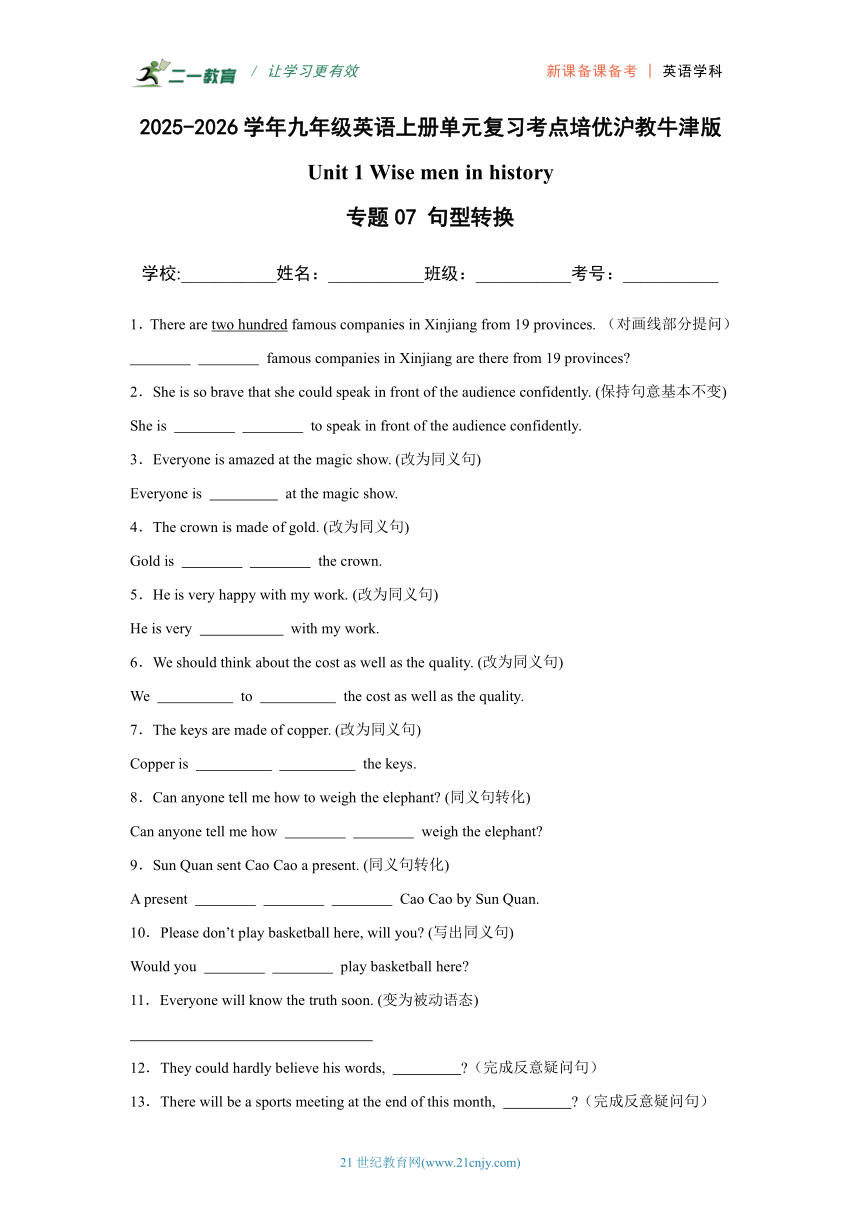 | |
| 格式 | docx | ||
| 文件大小 | 52.9KB | ||
| 资源类型 | 试卷 | ||
| 版本资源 | 牛津深圳版 | ||
| 科目 | 英语 | ||
| 更新时间 | 2025-08-07 11:41:47 | ||
图片预览

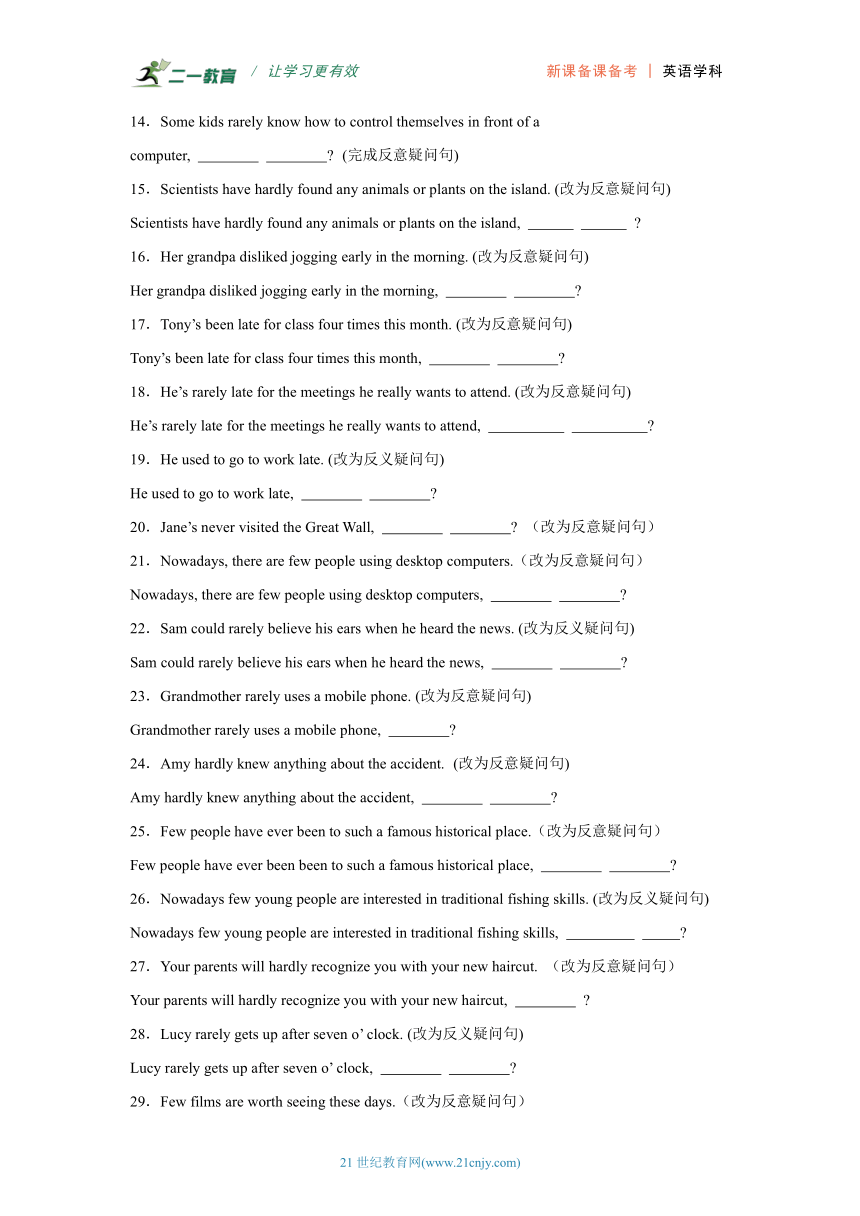
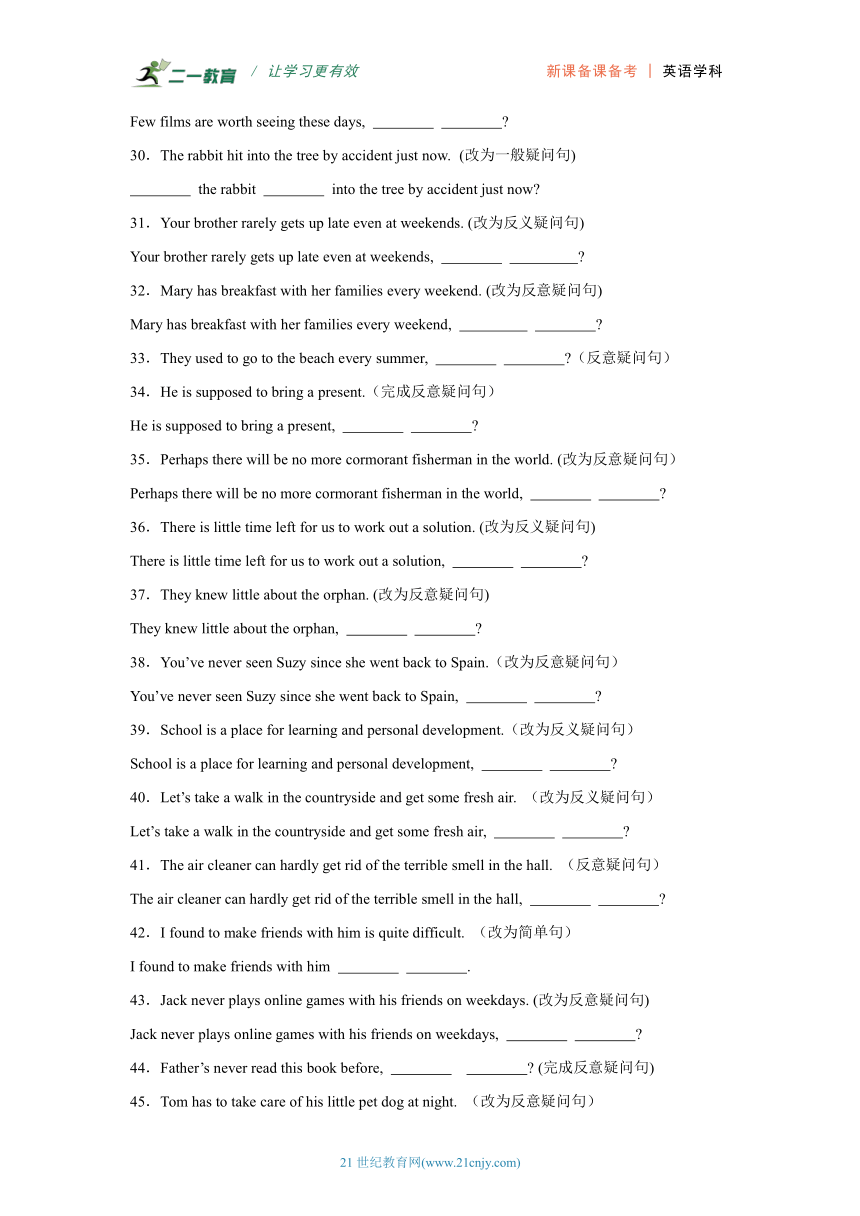
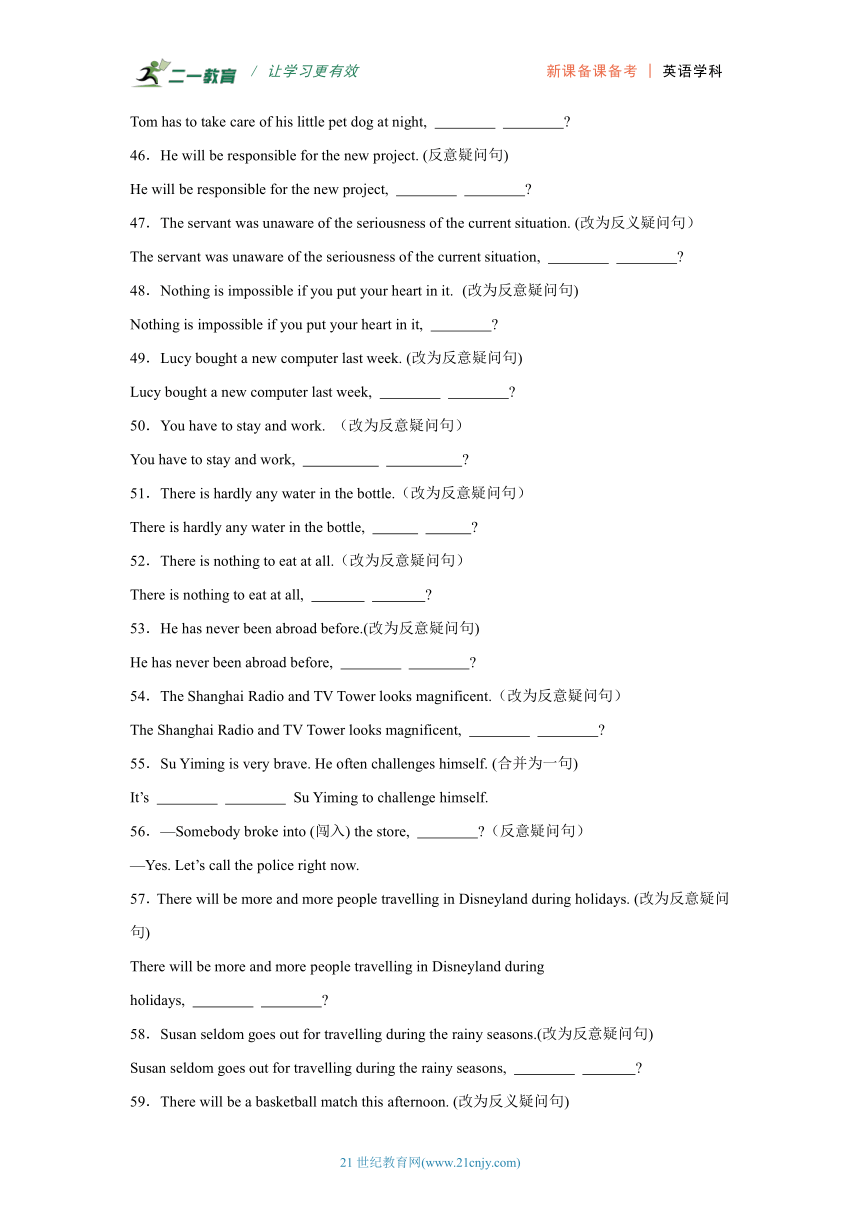
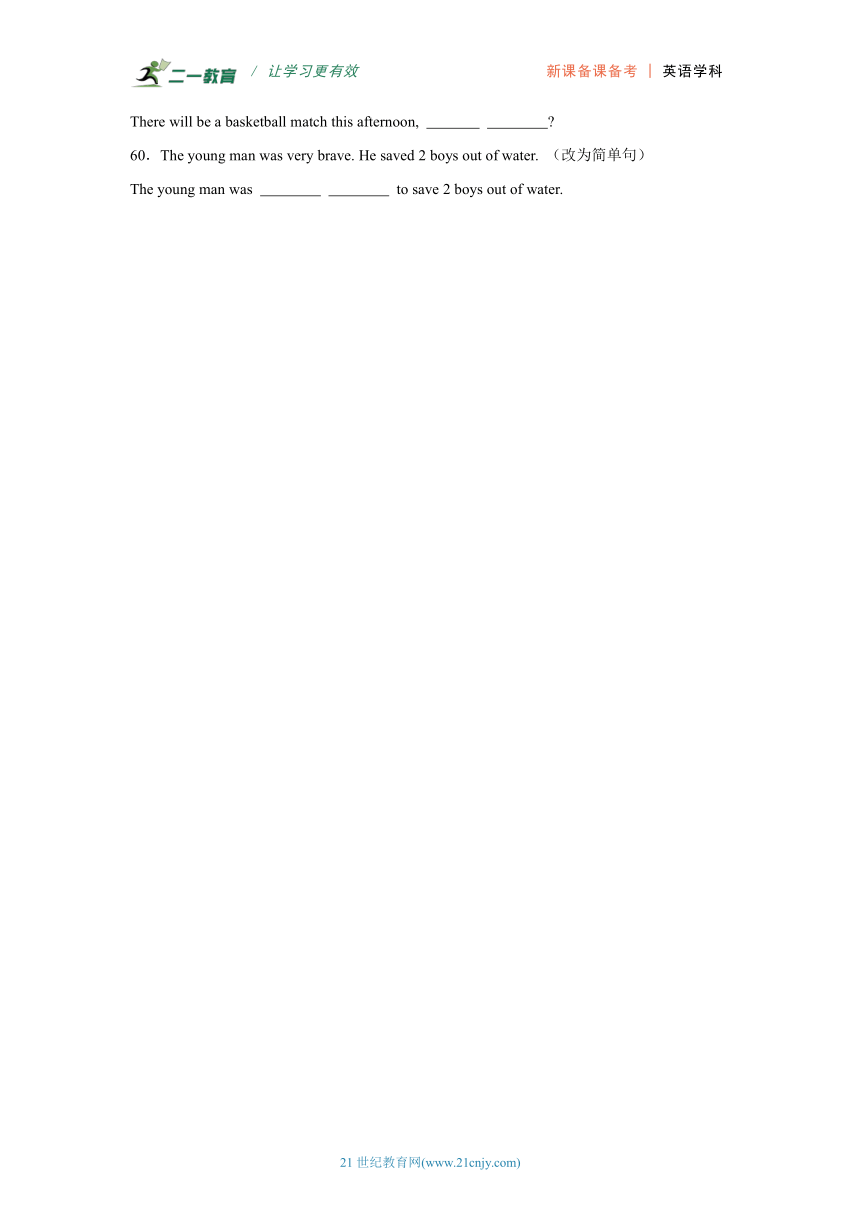
文档简介
/ 让学习更有效 新课备课备考 | 英语学科
/ 让学习更有效 新课备课备考 | 英语学科
2025-2026学年九年级英语上册单元复习考点培优沪教牛津版Unit 1 Wise men in history
专题07 句型转换
学校:___________姓名:___________班级:___________考号:___________
1.There are two hundred famous companies in Xinjiang from 19 provinces. (对画线部分提问)
famous companies in Xinjiang are there from 19 provinces
2.She is so brave that she could speak in front of the audience confidently. (保持句意基本不变)
She is to speak in front of the audience confidently.
3.Everyone is amazed at the magic show. (改为同义句)
Everyone is at the magic show.
4.The crown is made of gold. (改为同义句)
Gold is the crown.
5.He is very happy with my work. (改为同义句)
He is very with my work.
6.We should think about the cost as well as the quality. (改为同义句)
We to the cost as well as the quality.
7.The keys are made of copper. (改为同义句)
Copper is the keys.
8.Can anyone tell me how to weigh the elephant (同义句转化)
Can anyone tell me how weigh the elephant
9.Sun Quan sent Cao Cao a present. (同义句转化)
A present Cao Cao by Sun Quan.
10.Please don’t play basketball here, will you (写出同义句)
Would you play basketball here
11.Everyone will know the truth soon. (变为被动语态)
12.They could hardly believe his words, (完成反意疑问句)
13.There will be a sports meeting at the end of this month, (完成反意疑问句)
14.Some kids rarely know how to control themselves in front of a computer, (完成反意疑问句)
15.Scientists have hardly found any animals or plants on the island. (改为反意疑问句)
Scientists have hardly found any animals or plants on the island,
16.Her grandpa disliked jogging early in the morning. (改为反意疑问句)
Her grandpa disliked jogging early in the morning,
17.Tony’s been late for class four times this month. (改为反意疑问句)
Tony’s been late for class four times this month,
18.He’s rarely late for the meetings he really wants to attend. (改为反意疑问句)
He’s rarely late for the meetings he really wants to attend,
19.He used to go to work late. (改为反义疑问句)
He used to go to work late,
20.Jane’s never visited the Great Wall, (改为反意疑问句)
21.Nowadays, there are few people using desktop computers.(改为反意疑问句)
Nowadays, there are few people using desktop computers,
22.Sam could rarely believe his ears when he heard the news. (改为反义疑问句)
Sam could rarely believe his ears when he heard the news,
23.Grandmother rarely uses a mobile phone. (改为反意疑问句)
Grandmother rarely uses a mobile phone,
24.Amy hardly knew anything about the accident. (改为反意疑问句)
Amy hardly knew anything about the accident,
25.Few people have ever been to such a famous historical place.(改为反意疑问句)
Few people have ever been been to such a famous historical place,
26.Nowadays few young people are interested in traditional fishing skills. (改为反义疑问句)
Nowadays few young people are interested in traditional fishing skills,
27.Your parents will hardly recognize you with your new haircut. (改为反意疑问句)
Your parents will hardly recognize you with your new haircut,
28.Lucy rarely gets up after seven o’ clock. (改为反义疑问句)
Lucy rarely gets up after seven o’ clock,
29.Few films are worth seeing these days.(改为反意疑问句)
Few films are worth seeing these days,
30.The rabbit hit into the tree by accident just now. (改为一般疑问句)
the rabbit into the tree by accident just now
31.Your brother rarely gets up late even at weekends. (改为反义疑问句)
Your brother rarely gets up late even at weekends,
32.Mary has breakfast with her families every weekend. (改为反意疑问句)
Mary has breakfast with her families every weekend,
33.They used to go to the beach every summer, (反意疑问句)
34.He is supposed to bring a present.(完成反意疑问句)
He is supposed to bring a present,
35.Perhaps there will be no more cormorant fisherman in the world. (改为反意疑问句)
Perhaps there will be no more cormorant fisherman in the world,
36.There is little time left for us to work out a solution. (改为反义疑问句)
There is little time left for us to work out a solution,
37.They knew little about the orphan. (改为反意疑问句)
They knew little about the orphan,
38.You’ve never seen Suzy since she went back to Spain.(改为反意疑问句)
You’ve never seen Suzy since she went back to Spain,
39.School is a place for learning and personal development.(改为反义疑问句)
School is a place for learning and personal development,
40.Let’s take a walk in the countryside and get some fresh air. (改为反义疑问句)
Let’s take a walk in the countryside and get some fresh air,
41.The air cleaner can hardly get rid of the terrible smell in the hall. (反意疑问句)
The air cleaner can hardly get rid of the terrible smell in the hall,
42.I found to make friends with him is quite difficult. (改为简单句)
I found to make friends with him .
43.Jack never plays online games with his friends on weekdays. (改为反意疑问句)
Jack never plays online games with his friends on weekdays,
44.Father’s never read this book before, (完成反意疑问句)
45.Tom has to take care of his little pet dog at night. (改为反意疑问句)
Tom has to take care of his little pet dog at night,
46.He will be responsible for the new project. (反意疑问句)
He will be responsible for the new project,
47.The servant was unaware of the seriousness of the current situation. (改为反义疑问句)
The servant was unaware of the seriousness of the current situation,
48.Nothing is impossible if you put your heart in it. (改为反意疑问句)
Nothing is impossible if you put your heart in it,
49.Lucy bought a new computer last week. (改为反意疑问句)
Lucy bought a new computer last week,
50.You have to stay and work. (改为反意疑问句)
You have to stay and work,
51.There is hardly any water in the bottle.(改为反意疑问句)
There is hardly any water in the bottle,
52.There is nothing to eat at all.(改为反意疑问句)
There is nothing to eat at all,
53.He has never been abroad before.(改为反意疑问句)
He has never been abroad before,
54.The Shanghai Radio and TV Tower looks magnificent.(改为反意疑问句)
The Shanghai Radio and TV Tower looks magnificent,
55.Su Yiming is very brave. He often challenges himself. (合并为一句)
It’s Su Yiming to challenge himself.
56.—Somebody broke into (闯入) the store, (反意疑问句)
—Yes. Let’s call the police right now.
57.There will be more and more people travelling in Disneyland during holidays. (改为反意疑问句)
There will be more and more people travelling in Disneyland during holidays,
58.Susan seldom goes out for travelling during the rainy seasons.(改为反意疑问句)
Susan seldom goes out for travelling during the rainy seasons,
59.There will be a basketball match this afternoon. (改为反义疑问句)
There will be a basketball match this afternoon,
60.The young man was very brave. He saved 2 boys out of water. (改为简单句)
The young man was to save 2 boys out of water.
/ 让学习更有效 新课备课备考 | 英语学科
/ 让学习更有效 新课备课备考 | 英语学科
21世纪教育网(www.21cnjy.com)
21世纪教育网(www.21cnjy.com)
参考答案及试题解析
1.How many
【解析】句意:新疆有来自19个省的200多家知名企业。划线部分是数量,对可数名词数量提问用How many引导的特殊疑问句。故填How;many。
2.brave enough
【解析】句意:她如此勇敢,以至于能够自信地在观众面前发言。so...that结构表示“如此……以至于……”,可以与“adj+enough to do sth足够……做某事”结构互换。故填brave;enough。
3.surprised
【解析】句意:每个人都对魔术表演感到惊叹。be amazed at意为“对……感到惊奇”,此处可以替换为be surprised at,是固定短语。故填surprised。
4.made into
【解析】句意:这顶皇冠是由黄金做的。原句可以表达为“黄金被制成皇冠”,be made into意为“被制成”,是固定词组 。故填made;into。
5.pleased/satisfied
【解析】句意:他对我的工作非常满意。be happy with意为“对……满意”,此处可以将其替换为“be pleased with”或者“be satisfied with”,意为“对……满意”,意思一致。故填pleased/satisfied。
6.ought consider
【解析】句意:我们既要考虑质量,也要考虑成本。should意为“应该”,此处可以替换为“ought to”;think about意为“考虑”,此处可以替换为“consider”,情态动词后跟动词原形。故填ought;consider。
7.made into
【解析】句意:这些钥匙是铜制的。此处可以表达为“铜可以制成钥匙”,be made into意为“可以制成”,固定词组。故填made;into。
8.I can
【解析】句意:谁能告诉我怎么称大象的体重?原句中宾语从句“how to weigh”可改为引导词+主语+谓语动词+其他,主语为I“我”,动词可用情态动词can“可以”+动词原形。故填I;can。
9.was sent to
【解析】句意:孙权送了给曹操一件礼物。根据“A present…Cao Cao by Sun Quan.”可知,礼物是被送给曹操,应用被动语态,且原句为一般过去时,因此改写后的句子应用一般过去时的被动语态,其谓语动词结构为was/were done,主语“A present”为单数形式,因此用was;sent的动词原形为send“送”,其过去分词为sent;be sent to“被送给……”。故填was;sent;to。
10.please not
【解析】句意:请你不要在这里打篮球,好吗?否定祈使句的反意疑问句可以和Would you please not do sth. “请你不要做某事好吗 ?”互换。故填please;not。
11.The truth will be known by everyone soon.
【解析】句意:很快每个人都会知道真相。原句是一般将来时,一般将来时的被动语态结构为:will be+过去分词;原句中的宾语“the truth”变为主语;原句中的谓语“will know”变为“will be known”;原句中的主语“Everyone”在被动语态中用by引出,放在句末。故填The truth will be known by everyone soon.
12.could they
【解析】句意:他们几乎不敢相信他的话,是吗?反意疑问句的规则是“前肯后否,前否后肯”;在这个句子中,“hardly” 意思是“几乎不”,属于否定词,所以前面的陈述句部分表达否定含义,后面的附加疑问部分要用肯定形式;根据“They could hardly believe”可知,反意疑问句部分用“could”,主语是 “They”,所以反意疑问句就是“could they”。故填could they。
13.won’t there
【解析】句意:这个月底将会有一场运动会,是吗? 根据中文提示可知,反意疑问句的规则是“前肯后否,前否后肯”;原句“There will be a sports meeting at the end of this month”是一个肯定句,是一般将来时的“there be”句型,表示“将会有”,所以后面的反意疑问部分要用否定形式;一般将来时“will+动词原形”的否定形式是“won’t+动词原形”,对于“there be”句型的反意疑问句,后半部分仍然用“there”,所以这里反意疑问部分应该是“won’t there”。故填won’t there。
14.do they
【解析】句意:有些孩子在电脑前几乎不懂如何自我约束,对吧?根据“rarely”可知,陈述部分是否定形式,疑问部分用肯定形式;实义动词“know”为原形,助动词用do;主语“kids”是第三人称复数,用主格代词they指代。故填do;they。
15.have they
【解析】句意:科学家们在岛上几乎没发现任何动植物,是吗?反意疑问句遵循“前肯后否,前否后肯”原则,根据“hardly”可知陈述部分为否定意义,疑问部分应用肯定形式。根据“have hardly found”可知助动词为have,主语“Scientists”用they代替,故填have;they。
16.didn’t he
【解析】句意:她爷爷不喜欢一大早慢跑。反意疑问句遵循“前肯后否,前否后肯”原则,句中虽含有由否定前缀构成的单词“disliked”,但仍看作肯定形式;因“disliked”为过去式,所以疑问部分应用didn’t,用人称代词主格he代替“Her grandpa”。故填didn’t;he。
17.hasn’t he
【解析】句意:托尼这个月上课迟到了四次。反意疑问句遵循“前肯后否,前否后肯”的原则。陈述部分是肯定句,所以反问部分用否定形式。本句是现在完成时,助动词是has,否定是hasn’t,主语是he。故填hasn’t;he。
18.is he
【解析】句意:他真正想参加的会议很少迟到。反意疑问句构成为“陈述句+简短提问 ”,陈述句为肯定时,简短提问为否定,反之亦然。句中陈述句部分“rarely”表示否定,简短提问用肯定。句中“He’s”为“He is”的缩写,简短提问用is构成,主语为he。故填is;he。
19.didn’t he
【解析】句意:他过去常常上班迟到。根据“前肯后否,前否后肯”原则可知,疑问句部分用否定形式,句子时态是一般过去时,助动词用didn’t,人称代词用he。故填didn’t;he。
20.has she
【解析】句意:简从来没有去过长城,是吗?反意疑问句遵循“前肯后否,前否后肯”,陈述部分有否定词never,疑问部分用肯定;此处Jane’s是“Jane has”的缩写,疑问部分的助动词用has,Jane是女性,代词用she,故填has;she。
21.are there
【解析】句意:现在,很少有人使用台式电脑。反意疑问句遵循“前肯后否,前否后肯”原则。题干中“there are few people”表示否定意义,因此疑问部分用肯定形式“are there”。故填are;there。
22.could he
【解析】句意:当山姆听到这个消息时,他几乎不敢相信自己的耳朵。反义疑问句通常遵循“前肯后否或前否后肯”的原则。rarely意为“几乎不”,是否定词,所以前半句是否定形式,疑问部分应用肯定形式;陈述部分有情态动词could,因此疑问部分用could,Sam用人称代词he代替。故填could;he。
23.does she
【解析】句意:奶奶很少用手机。根据“uses”可知,原句谓语动词为实义动词,且为一般现在时的三单形式,rarely意为“很少地”,表示否定,反意疑问句遵循“前肯后否,前否后肯”原则,因此反意疑问句部分应用肯定,借助助动词does,后加主语she“她”。故填does she。
24.did she
【解析】句意:Amy对那次事故几乎一无所知。反意疑问句遵循 “前肯后否,前否后肯”原则,根据“hardly”可知,陈述部分表示否定含义,所以疑问部分使用肯定形式;原句时态为一般过去时,所以助动词使用did,主语“Amy”为女性,疑问部分用she代替。故填did;she。
25.have they
【解析】句意:很少有人去过这么有名的历史名胜。变反意疑问句遵循“前肯后否,前否后肯”的原则,原句中的few意为“很少”,表否定,所以反意疑问句为肯定。原句中的助动词have照抄,主语few people用人称代词they指代。故填have;they。
26.are they
【解析】句意:现在,很少有年轻人对传统的捕鱼技巧感兴趣。根据“few”可知,陈述部分是否定,疑问部分用肯定,结合are可知,疑问部分也用are,用they代替young people。故填are;they。
27.will they
【解析】句意:你刚理发,你的父母将几乎认不出你。根据“will hardly”可知,原句为一般将来时的否定句,改为反意疑问句时,附加疑问部分应用一般将来时的肯定句,主语用they指代“your parents”,助动词用will。故填will they。
28.does she
【解析】句意:露西很少在七点以后起床。根据“rarely”可知,陈述部分为否定,则疑问部分应为肯定;结合“gets”可知,句子时态为一般现在时,谓语动词为实义动词,变问句时要借助助动词do/does;主语Lucy为第三人称单数,助动词用does,且为女性,应用人称代词主格she指代。故填does;she。
29.are they
【解析】句意:现在很少有值得看的电影。反意疑问句要满足“前肯后否,前否后肯”的原则,根据陈述句中的“Few”可知,疑问句部分用肯定形式。陈述句的主语是“Few films”,疑问部分用代词they代替,谓语是are,故填are;they。
30.Did hit
【解析】句意:刚才那只兔子不小心撞到了树上。根据just now可知,此句是一般过去时,hit是动词过去式,改为一般疑问句借助于助动词did,hit恢复原形hit,故填Did;hit。
31.does he
【解析】句意:你弟弟即使在周末也很少起得晚。反意疑问句遵循“前肯后否,前否后肯”原则,根据“rarely”可知陈述部分是否定意义,疑问部分应用肯定形式;根据“Your brother”可知主语用代词he“他”代替,根据“gets”可知助动词用does。故填does;he。
32.doesn’t she
【解析】句意:Mary每周末都会和她的家人吃早餐。反意疑问句的结构是:肯定的陈述句+否定的附加问句或者否定的陈述句+肯定的附加问句,分析“Mary has breakfast with her families every weekend”可知,这是一个肯定的陈述句,所以附加问句是否定式,句中包含实义动词has“吃”,主语Mary表示单数,所以用doesn’t表示否定,用she代替主语Mary,故填doesn’t;she。
33.didn’t they
【解析】句意:他们过去每年夏天都去海滩,不是吗?反意疑问句遵循前肯后否,前否后肯,根据“They used to...”可知疑问部分用否定形式,且借助助动词didn’t,主语是they。故填didn’t;they。
34.isn’t he
【解析】句意:他应该带一件礼物来。反意疑问句遵循“前肯后否,前否后肯”原则,陈述句是肯定,附加疑问部分用否定,谓语动词用isn’t,主语用he。故填isn’t;he。
35.will there
【解析】句意:也许世界上再也不会有鸬鹚了。前句是否定句,反意疑问句部分用肯定结构,原句是一般将来时,是there be句型的将来时,反意疑问句部分用助动词will there,故填will;there。
36.is there
【解析】句意:我们几乎没有时间来制定一个解决方案。反义疑问句遵循“前肯后否或前否后肯”,little time提示陈述句部分是否定句,所以附加问句用肯定形式,there is的问句形式是is there。故填is;there。
37.did they
【解析】句意:他们对这个孤儿知之甚少。根据“They knew little...”可知,此句时态为一般过去时,主语是复数,“little”表示否定含义,所以疑问部分用肯定式,助动词用did,后加主语they。故填did;they。
38.have you
【解析】句意:自从苏西回西班牙你就没见过她。前半句含有否定词never,反意疑问句遵循“前否后肯”原则,前半句的’ve是现在完成时中的助动词have,反意部分也用have,陈述部分主语是you,疑问部分主语也用you。故填have;you。
39.isn’t it
【解析】句意:学校是一个学习和个人发展的地方。考查肯定句改为反意疑问句。反意疑问句遵循“前肯后否,前否后肯”的原则,前句是肯定句且含be动词is,反意疑问句应为否定句,故第一空为isn’t,第二空为代词it指代school。故填isn’t;it。
40.shall we
【解析】句意:让我们到乡下散散步,呼吸点新鲜空气吧。以Let’s开头的祈使句,后面的附加问句要用shall we。故填shall;we。
41.can it
【解析】句意:空气净化器很难清除大厅里难闻的气味。反意疑问句遵循“前肯后否,前否后肯”原则;hardly是否定词,句子应用前否后肯;疑问部分主语用代词it来代替The air cleaner。故填can;it。
42.quite difficult
【解析】句意:我发现,要和他交朋友挺难的。考查复合句改为简单句。原句为含有省略引导词that引导的宾语从句,谓语动词为found,可改为“主+谓+宾+宾补”的简单句,to make friends with him作宾语,形容词短语quite difficult作宾语补足语。故填quite;difficult。
43.does he
【解析】句意:杰克在工作日从不和朋友玩网络游戏。never意为“从不”,表示否定意义,所以陈述部分是否定形式,而后面附加问句部分要用肯定形式;附加问句的主语必须是代词,并且应与陈述部分的主语“Jack”一致,因此应填he;谓语动词在人称、数和时态方面要与陈述部分“plays”一致,所以应填does。故填does;he。
44.has he
【解析】句意:父亲以前从未读过这本书,是吗?原句是现在完成时的句子,前句有否定词never,此处反意疑问句应用肯定形式,主语应用he代替,助动词用has,故填has;he。
45.doesn’t he
【解析】句意:汤姆必须要在晚上照顾他的小宠物狗。考查反意疑问句的句式,其结构为:陈述句,助动词/be动词/情态动词+主语?,需要注意反意疑问部分需遵循前肯后否/前否后肯的原则,且主语不用名词,需使用代词。句子谓语为has to take care,使用了一般现在时,且为肯定,所以使用助动词doesn’t,主语是Tom,改为he。故填doesn’t;he。
46.won’t he
【解析】句意:他将负责这个新项目。根据will可知,疑问部分用否定,will的否定形式是won’t,代词用he,故填won’t;he。
47.wasn’t he
【解析】句意:仆人没有意识到当前形势的严重性。句子时态是一般过去时,主语是第三人称单数,反义疑问句的助动词用was;根据反义疑问句变化规则“前肯后否,前否后肯”可知,陈述部分是是肯定句式,疑问部分用否定,其结构为“助动词+not+代词 (主格)”。故填wasn’t;he。
48.is it
【解析】句意:世上无难事,只怕有心人。原句是含有否定词nothing,故反意疑问句部分应用肯定结构,原句动词是is,此处也用is,原句主语是不定代词,此处应用it代替,故填is it。
49.didn’t she
【解析】句意:露西上周买了一台新电脑。反意疑问句通常遵循前肯后否,前否后肯的原则。根据题干可知,前半句是含有实义动词的一般过去时,是肯定句,反义疑问用否定形式,先加助动词did,再加not,用代词she代替Lucy,故填didn’t;she。
50.don’t you
【解析】句意:你必须留下来工作。改为反意疑问句,根据“前肯后否,前否后肯”原则可知,陈述句为肯定句,所以简短附加问句要用否定形式。根据陈述句中的have可知,附加问句要用助动词do的否定形式don’t。附加问句中的主语要用代词。根据陈述句中的you可知,附加问句中的主语应用you。故填don’t;you。
51.is there
【解析】句意:瓶子里几乎没有水了。反意疑问句的组成:前面的陈述部分和后面的疑问部分,并且还要遵循“前肯后否,前否后肯”的原则。根据“hardly”可知,其意思为“几乎不”,表否定含义,故前面为否定句,后面疑问部分应用肯定形式。由“There is”可知,句子为“There be”句型,其一般疑问句形式是直接将there和is交换位置,即is there。故填is;there。
52.is there
【解析】句意:一点吃的都没有。反意疑问句遵循“前肯后否,前否后肯”的原则。陈述部分nothing是否定词,疑问部分用肯定,根据there is可知,反意部分应填is there,故填is;there。
53.has he
【解析】句意:他以前从未出过国。本句前面为has never been是否定,反意部分用助动词has表肯定;主语是he,故填has;he。
54.doesn’t it
【解析】句意:上海广播电视塔看起来很壮观。本题要求改为反意疑问句,根据反意疑问句“前肯后否,前否后肯”原则以及“The Shanghai Radio and TV Tower looks magnificent”是肯定句,可知则后半句应用否定句,looks在句中是实义动词,时态是一般现在时,主语为第三人称单数,所以后面的否定句应用相应的助动词doesn’t,同时用it代替前面的主语。故答案为doesn’t;it。
55.brave of
【解析】句意:苏翊鸣很勇敢。他经常挑战自己。此处可用“It’s+adj+of sb to do sth”句型表示,brave“勇敢的”。故填brave;of。
56.didn’t he
【解析】句意:——有人闯进了商店,不是吗?——是的。让我们马上给警察打电话。此处是反意疑问句,陈述部分是肯定形式,疑问部分用否定形式,谓语broke是实义动词break的过去式,因此否定助动词为didn’t,somebody用代词he代指,故填didn’t he。
57.won’t there
【解析】句意:假期里会有越来越多的人去迪斯尼乐园旅游。分析句子可知句子是一般将来时的There be句型,变为反意疑问句,需要使用助动词will和there,前肯后否,故此处第一个空为will not,缩写为won’t,第二个空为there。故填won’t;there。
58.does she
【解析】句意:Susan在雨季很少出去旅行。反意疑问句由“陈述句+疑问尾句”两部分组成,遵循“前肯后否,前否后肯”原则;根据“seldom”可知,陈述句是否定句,所以疑问句为肯定句。原句是一般现在时,句中goes是实义动词go的第三人称单数形式,所以助动词用“does”;故填does;she。
59.won’t there
【解析】句意:今天下午将有一场篮球赛。 反意疑问句遵循“前肯后否,前否后肯”,此句陈述部分是肯定,疑问部分用否定,根据“There will”可知,此处的否定形式用won’t there,故填won’t;there。
60.brave enough
【解析】句意:这个年轻人非常勇敢。他从水里救了两个男孩。改为简单句时要保证句意不变,用be adj. enough to do sth.表示“足够……做某事”,was后用形容词brave。故填brave;enough。
21世纪教育网(www.21cnjy.com)
21世纪教育网(www.21cnjy.com)
/ 让学习更有效 新课备课备考 | 英语学科
2025-2026学年九年级英语上册单元复习考点培优沪教牛津版Unit 1 Wise men in history
专题07 句型转换
学校:___________姓名:___________班级:___________考号:___________
1.There are two hundred famous companies in Xinjiang from 19 provinces. (对画线部分提问)
famous companies in Xinjiang are there from 19 provinces
2.She is so brave that she could speak in front of the audience confidently. (保持句意基本不变)
She is to speak in front of the audience confidently.
3.Everyone is amazed at the magic show. (改为同义句)
Everyone is at the magic show.
4.The crown is made of gold. (改为同义句)
Gold is the crown.
5.He is very happy with my work. (改为同义句)
He is very with my work.
6.We should think about the cost as well as the quality. (改为同义句)
We to the cost as well as the quality.
7.The keys are made of copper. (改为同义句)
Copper is the keys.
8.Can anyone tell me how to weigh the elephant (同义句转化)
Can anyone tell me how weigh the elephant
9.Sun Quan sent Cao Cao a present. (同义句转化)
A present Cao Cao by Sun Quan.
10.Please don’t play basketball here, will you (写出同义句)
Would you play basketball here
11.Everyone will know the truth soon. (变为被动语态)
12.They could hardly believe his words, (完成反意疑问句)
13.There will be a sports meeting at the end of this month, (完成反意疑问句)
14.Some kids rarely know how to control themselves in front of a computer, (完成反意疑问句)
15.Scientists have hardly found any animals or plants on the island. (改为反意疑问句)
Scientists have hardly found any animals or plants on the island,
16.Her grandpa disliked jogging early in the morning. (改为反意疑问句)
Her grandpa disliked jogging early in the morning,
17.Tony’s been late for class four times this month. (改为反意疑问句)
Tony’s been late for class four times this month,
18.He’s rarely late for the meetings he really wants to attend. (改为反意疑问句)
He’s rarely late for the meetings he really wants to attend,
19.He used to go to work late. (改为反义疑问句)
He used to go to work late,
20.Jane’s never visited the Great Wall, (改为反意疑问句)
21.Nowadays, there are few people using desktop computers.(改为反意疑问句)
Nowadays, there are few people using desktop computers,
22.Sam could rarely believe his ears when he heard the news. (改为反义疑问句)
Sam could rarely believe his ears when he heard the news,
23.Grandmother rarely uses a mobile phone. (改为反意疑问句)
Grandmother rarely uses a mobile phone,
24.Amy hardly knew anything about the accident. (改为反意疑问句)
Amy hardly knew anything about the accident,
25.Few people have ever been to such a famous historical place.(改为反意疑问句)
Few people have ever been been to such a famous historical place,
26.Nowadays few young people are interested in traditional fishing skills. (改为反义疑问句)
Nowadays few young people are interested in traditional fishing skills,
27.Your parents will hardly recognize you with your new haircut. (改为反意疑问句)
Your parents will hardly recognize you with your new haircut,
28.Lucy rarely gets up after seven o’ clock. (改为反义疑问句)
Lucy rarely gets up after seven o’ clock,
29.Few films are worth seeing these days.(改为反意疑问句)
Few films are worth seeing these days,
30.The rabbit hit into the tree by accident just now. (改为一般疑问句)
the rabbit into the tree by accident just now
31.Your brother rarely gets up late even at weekends. (改为反义疑问句)
Your brother rarely gets up late even at weekends,
32.Mary has breakfast with her families every weekend. (改为反意疑问句)
Mary has breakfast with her families every weekend,
33.They used to go to the beach every summer, (反意疑问句)
34.He is supposed to bring a present.(完成反意疑问句)
He is supposed to bring a present,
35.Perhaps there will be no more cormorant fisherman in the world. (改为反意疑问句)
Perhaps there will be no more cormorant fisherman in the world,
36.There is little time left for us to work out a solution. (改为反义疑问句)
There is little time left for us to work out a solution,
37.They knew little about the orphan. (改为反意疑问句)
They knew little about the orphan,
38.You’ve never seen Suzy since she went back to Spain.(改为反意疑问句)
You’ve never seen Suzy since she went back to Spain,
39.School is a place for learning and personal development.(改为反义疑问句)
School is a place for learning and personal development,
40.Let’s take a walk in the countryside and get some fresh air. (改为反义疑问句)
Let’s take a walk in the countryside and get some fresh air,
41.The air cleaner can hardly get rid of the terrible smell in the hall. (反意疑问句)
The air cleaner can hardly get rid of the terrible smell in the hall,
42.I found to make friends with him is quite difficult. (改为简单句)
I found to make friends with him .
43.Jack never plays online games with his friends on weekdays. (改为反意疑问句)
Jack never plays online games with his friends on weekdays,
44.Father’s never read this book before, (完成反意疑问句)
45.Tom has to take care of his little pet dog at night. (改为反意疑问句)
Tom has to take care of his little pet dog at night,
46.He will be responsible for the new project. (反意疑问句)
He will be responsible for the new project,
47.The servant was unaware of the seriousness of the current situation. (改为反义疑问句)
The servant was unaware of the seriousness of the current situation,
48.Nothing is impossible if you put your heart in it. (改为反意疑问句)
Nothing is impossible if you put your heart in it,
49.Lucy bought a new computer last week. (改为反意疑问句)
Lucy bought a new computer last week,
50.You have to stay and work. (改为反意疑问句)
You have to stay and work,
51.There is hardly any water in the bottle.(改为反意疑问句)
There is hardly any water in the bottle,
52.There is nothing to eat at all.(改为反意疑问句)
There is nothing to eat at all,
53.He has never been abroad before.(改为反意疑问句)
He has never been abroad before,
54.The Shanghai Radio and TV Tower looks magnificent.(改为反意疑问句)
The Shanghai Radio and TV Tower looks magnificent,
55.Su Yiming is very brave. He often challenges himself. (合并为一句)
It’s Su Yiming to challenge himself.
56.—Somebody broke into (闯入) the store, (反意疑问句)
—Yes. Let’s call the police right now.
57.There will be more and more people travelling in Disneyland during holidays. (改为反意疑问句)
There will be more and more people travelling in Disneyland during holidays,
58.Susan seldom goes out for travelling during the rainy seasons.(改为反意疑问句)
Susan seldom goes out for travelling during the rainy seasons,
59.There will be a basketball match this afternoon. (改为反义疑问句)
There will be a basketball match this afternoon,
60.The young man was very brave. He saved 2 boys out of water. (改为简单句)
The young man was to save 2 boys out of water.
/ 让学习更有效 新课备课备考 | 英语学科
/ 让学习更有效 新课备课备考 | 英语学科
21世纪教育网(www.21cnjy.com)
21世纪教育网(www.21cnjy.com)
参考答案及试题解析
1.How many
【解析】句意:新疆有来自19个省的200多家知名企业。划线部分是数量,对可数名词数量提问用How many引导的特殊疑问句。故填How;many。
2.brave enough
【解析】句意:她如此勇敢,以至于能够自信地在观众面前发言。so...that结构表示“如此……以至于……”,可以与“adj+enough to do sth足够……做某事”结构互换。故填brave;enough。
3.surprised
【解析】句意:每个人都对魔术表演感到惊叹。be amazed at意为“对……感到惊奇”,此处可以替换为be surprised at,是固定短语。故填surprised。
4.made into
【解析】句意:这顶皇冠是由黄金做的。原句可以表达为“黄金被制成皇冠”,be made into意为“被制成”,是固定词组 。故填made;into。
5.pleased/satisfied
【解析】句意:他对我的工作非常满意。be happy with意为“对……满意”,此处可以将其替换为“be pleased with”或者“be satisfied with”,意为“对……满意”,意思一致。故填pleased/satisfied。
6.ought consider
【解析】句意:我们既要考虑质量,也要考虑成本。should意为“应该”,此处可以替换为“ought to”;think about意为“考虑”,此处可以替换为“consider”,情态动词后跟动词原形。故填ought;consider。
7.made into
【解析】句意:这些钥匙是铜制的。此处可以表达为“铜可以制成钥匙”,be made into意为“可以制成”,固定词组。故填made;into。
8.I can
【解析】句意:谁能告诉我怎么称大象的体重?原句中宾语从句“how to weigh”可改为引导词+主语+谓语动词+其他,主语为I“我”,动词可用情态动词can“可以”+动词原形。故填I;can。
9.was sent to
【解析】句意:孙权送了给曹操一件礼物。根据“A present…Cao Cao by Sun Quan.”可知,礼物是被送给曹操,应用被动语态,且原句为一般过去时,因此改写后的句子应用一般过去时的被动语态,其谓语动词结构为was/were done,主语“A present”为单数形式,因此用was;sent的动词原形为send“送”,其过去分词为sent;be sent to“被送给……”。故填was;sent;to。
10.please not
【解析】句意:请你不要在这里打篮球,好吗?否定祈使句的反意疑问句可以和Would you please not do sth. “请你不要做某事好吗 ?”互换。故填please;not。
11.The truth will be known by everyone soon.
【解析】句意:很快每个人都会知道真相。原句是一般将来时,一般将来时的被动语态结构为:will be+过去分词;原句中的宾语“the truth”变为主语;原句中的谓语“will know”变为“will be known”;原句中的主语“Everyone”在被动语态中用by引出,放在句末。故填The truth will be known by everyone soon.
12.could they
【解析】句意:他们几乎不敢相信他的话,是吗?反意疑问句的规则是“前肯后否,前否后肯”;在这个句子中,“hardly” 意思是“几乎不”,属于否定词,所以前面的陈述句部分表达否定含义,后面的附加疑问部分要用肯定形式;根据“They could hardly believe”可知,反意疑问句部分用“could”,主语是 “They”,所以反意疑问句就是“could they”。故填could they。
13.won’t there
【解析】句意:这个月底将会有一场运动会,是吗? 根据中文提示可知,反意疑问句的规则是“前肯后否,前否后肯”;原句“There will be a sports meeting at the end of this month”是一个肯定句,是一般将来时的“there be”句型,表示“将会有”,所以后面的反意疑问部分要用否定形式;一般将来时“will+动词原形”的否定形式是“won’t+动词原形”,对于“there be”句型的反意疑问句,后半部分仍然用“there”,所以这里反意疑问部分应该是“won’t there”。故填won’t there。
14.do they
【解析】句意:有些孩子在电脑前几乎不懂如何自我约束,对吧?根据“rarely”可知,陈述部分是否定形式,疑问部分用肯定形式;实义动词“know”为原形,助动词用do;主语“kids”是第三人称复数,用主格代词they指代。故填do;they。
15.have they
【解析】句意:科学家们在岛上几乎没发现任何动植物,是吗?反意疑问句遵循“前肯后否,前否后肯”原则,根据“hardly”可知陈述部分为否定意义,疑问部分应用肯定形式。根据“have hardly found”可知助动词为have,主语“Scientists”用they代替,故填have;they。
16.didn’t he
【解析】句意:她爷爷不喜欢一大早慢跑。反意疑问句遵循“前肯后否,前否后肯”原则,句中虽含有由否定前缀构成的单词“disliked”,但仍看作肯定形式;因“disliked”为过去式,所以疑问部分应用didn’t,用人称代词主格he代替“Her grandpa”。故填didn’t;he。
17.hasn’t he
【解析】句意:托尼这个月上课迟到了四次。反意疑问句遵循“前肯后否,前否后肯”的原则。陈述部分是肯定句,所以反问部分用否定形式。本句是现在完成时,助动词是has,否定是hasn’t,主语是he。故填hasn’t;he。
18.is he
【解析】句意:他真正想参加的会议很少迟到。反意疑问句构成为“陈述句+简短提问 ”,陈述句为肯定时,简短提问为否定,反之亦然。句中陈述句部分“rarely”表示否定,简短提问用肯定。句中“He’s”为“He is”的缩写,简短提问用is构成,主语为he。故填is;he。
19.didn’t he
【解析】句意:他过去常常上班迟到。根据“前肯后否,前否后肯”原则可知,疑问句部分用否定形式,句子时态是一般过去时,助动词用didn’t,人称代词用he。故填didn’t;he。
20.has she
【解析】句意:简从来没有去过长城,是吗?反意疑问句遵循“前肯后否,前否后肯”,陈述部分有否定词never,疑问部分用肯定;此处Jane’s是“Jane has”的缩写,疑问部分的助动词用has,Jane是女性,代词用she,故填has;she。
21.are there
【解析】句意:现在,很少有人使用台式电脑。反意疑问句遵循“前肯后否,前否后肯”原则。题干中“there are few people”表示否定意义,因此疑问部分用肯定形式“are there”。故填are;there。
22.could he
【解析】句意:当山姆听到这个消息时,他几乎不敢相信自己的耳朵。反义疑问句通常遵循“前肯后否或前否后肯”的原则。rarely意为“几乎不”,是否定词,所以前半句是否定形式,疑问部分应用肯定形式;陈述部分有情态动词could,因此疑问部分用could,Sam用人称代词he代替。故填could;he。
23.does she
【解析】句意:奶奶很少用手机。根据“uses”可知,原句谓语动词为实义动词,且为一般现在时的三单形式,rarely意为“很少地”,表示否定,反意疑问句遵循“前肯后否,前否后肯”原则,因此反意疑问句部分应用肯定,借助助动词does,后加主语she“她”。故填does she。
24.did she
【解析】句意:Amy对那次事故几乎一无所知。反意疑问句遵循 “前肯后否,前否后肯”原则,根据“hardly”可知,陈述部分表示否定含义,所以疑问部分使用肯定形式;原句时态为一般过去时,所以助动词使用did,主语“Amy”为女性,疑问部分用she代替。故填did;she。
25.have they
【解析】句意:很少有人去过这么有名的历史名胜。变反意疑问句遵循“前肯后否,前否后肯”的原则,原句中的few意为“很少”,表否定,所以反意疑问句为肯定。原句中的助动词have照抄,主语few people用人称代词they指代。故填have;they。
26.are they
【解析】句意:现在,很少有年轻人对传统的捕鱼技巧感兴趣。根据“few”可知,陈述部分是否定,疑问部分用肯定,结合are可知,疑问部分也用are,用they代替young people。故填are;they。
27.will they
【解析】句意:你刚理发,你的父母将几乎认不出你。根据“will hardly”可知,原句为一般将来时的否定句,改为反意疑问句时,附加疑问部分应用一般将来时的肯定句,主语用they指代“your parents”,助动词用will。故填will they。
28.does she
【解析】句意:露西很少在七点以后起床。根据“rarely”可知,陈述部分为否定,则疑问部分应为肯定;结合“gets”可知,句子时态为一般现在时,谓语动词为实义动词,变问句时要借助助动词do/does;主语Lucy为第三人称单数,助动词用does,且为女性,应用人称代词主格she指代。故填does;she。
29.are they
【解析】句意:现在很少有值得看的电影。反意疑问句要满足“前肯后否,前否后肯”的原则,根据陈述句中的“Few”可知,疑问句部分用肯定形式。陈述句的主语是“Few films”,疑问部分用代词they代替,谓语是are,故填are;they。
30.Did hit
【解析】句意:刚才那只兔子不小心撞到了树上。根据just now可知,此句是一般过去时,hit是动词过去式,改为一般疑问句借助于助动词did,hit恢复原形hit,故填Did;hit。
31.does he
【解析】句意:你弟弟即使在周末也很少起得晚。反意疑问句遵循“前肯后否,前否后肯”原则,根据“rarely”可知陈述部分是否定意义,疑问部分应用肯定形式;根据“Your brother”可知主语用代词he“他”代替,根据“gets”可知助动词用does。故填does;he。
32.doesn’t she
【解析】句意:Mary每周末都会和她的家人吃早餐。反意疑问句的结构是:肯定的陈述句+否定的附加问句或者否定的陈述句+肯定的附加问句,分析“Mary has breakfast with her families every weekend”可知,这是一个肯定的陈述句,所以附加问句是否定式,句中包含实义动词has“吃”,主语Mary表示单数,所以用doesn’t表示否定,用she代替主语Mary,故填doesn’t;she。
33.didn’t they
【解析】句意:他们过去每年夏天都去海滩,不是吗?反意疑问句遵循前肯后否,前否后肯,根据“They used to...”可知疑问部分用否定形式,且借助助动词didn’t,主语是they。故填didn’t;they。
34.isn’t he
【解析】句意:他应该带一件礼物来。反意疑问句遵循“前肯后否,前否后肯”原则,陈述句是肯定,附加疑问部分用否定,谓语动词用isn’t,主语用he。故填isn’t;he。
35.will there
【解析】句意:也许世界上再也不会有鸬鹚了。前句是否定句,反意疑问句部分用肯定结构,原句是一般将来时,是there be句型的将来时,反意疑问句部分用助动词will there,故填will;there。
36.is there
【解析】句意:我们几乎没有时间来制定一个解决方案。反义疑问句遵循“前肯后否或前否后肯”,little time提示陈述句部分是否定句,所以附加问句用肯定形式,there is的问句形式是is there。故填is;there。
37.did they
【解析】句意:他们对这个孤儿知之甚少。根据“They knew little...”可知,此句时态为一般过去时,主语是复数,“little”表示否定含义,所以疑问部分用肯定式,助动词用did,后加主语they。故填did;they。
38.have you
【解析】句意:自从苏西回西班牙你就没见过她。前半句含有否定词never,反意疑问句遵循“前否后肯”原则,前半句的’ve是现在完成时中的助动词have,反意部分也用have,陈述部分主语是you,疑问部分主语也用you。故填have;you。
39.isn’t it
【解析】句意:学校是一个学习和个人发展的地方。考查肯定句改为反意疑问句。反意疑问句遵循“前肯后否,前否后肯”的原则,前句是肯定句且含be动词is,反意疑问句应为否定句,故第一空为isn’t,第二空为代词it指代school。故填isn’t;it。
40.shall we
【解析】句意:让我们到乡下散散步,呼吸点新鲜空气吧。以Let’s开头的祈使句,后面的附加问句要用shall we。故填shall;we。
41.can it
【解析】句意:空气净化器很难清除大厅里难闻的气味。反意疑问句遵循“前肯后否,前否后肯”原则;hardly是否定词,句子应用前否后肯;疑问部分主语用代词it来代替The air cleaner。故填can;it。
42.quite difficult
【解析】句意:我发现,要和他交朋友挺难的。考查复合句改为简单句。原句为含有省略引导词that引导的宾语从句,谓语动词为found,可改为“主+谓+宾+宾补”的简单句,to make friends with him作宾语,形容词短语quite difficult作宾语补足语。故填quite;difficult。
43.does he
【解析】句意:杰克在工作日从不和朋友玩网络游戏。never意为“从不”,表示否定意义,所以陈述部分是否定形式,而后面附加问句部分要用肯定形式;附加问句的主语必须是代词,并且应与陈述部分的主语“Jack”一致,因此应填he;谓语动词在人称、数和时态方面要与陈述部分“plays”一致,所以应填does。故填does;he。
44.has he
【解析】句意:父亲以前从未读过这本书,是吗?原句是现在完成时的句子,前句有否定词never,此处反意疑问句应用肯定形式,主语应用he代替,助动词用has,故填has;he。
45.doesn’t he
【解析】句意:汤姆必须要在晚上照顾他的小宠物狗。考查反意疑问句的句式,其结构为:陈述句,助动词/be动词/情态动词+主语?,需要注意反意疑问部分需遵循前肯后否/前否后肯的原则,且主语不用名词,需使用代词。句子谓语为has to take care,使用了一般现在时,且为肯定,所以使用助动词doesn’t,主语是Tom,改为he。故填doesn’t;he。
46.won’t he
【解析】句意:他将负责这个新项目。根据will可知,疑问部分用否定,will的否定形式是won’t,代词用he,故填won’t;he。
47.wasn’t he
【解析】句意:仆人没有意识到当前形势的严重性。句子时态是一般过去时,主语是第三人称单数,反义疑问句的助动词用was;根据反义疑问句变化规则“前肯后否,前否后肯”可知,陈述部分是是肯定句式,疑问部分用否定,其结构为“助动词+not+代词 (主格)”。故填wasn’t;he。
48.is it
【解析】句意:世上无难事,只怕有心人。原句是含有否定词nothing,故反意疑问句部分应用肯定结构,原句动词是is,此处也用is,原句主语是不定代词,此处应用it代替,故填is it。
49.didn’t she
【解析】句意:露西上周买了一台新电脑。反意疑问句通常遵循前肯后否,前否后肯的原则。根据题干可知,前半句是含有实义动词的一般过去时,是肯定句,反义疑问用否定形式,先加助动词did,再加not,用代词she代替Lucy,故填didn’t;she。
50.don’t you
【解析】句意:你必须留下来工作。改为反意疑问句,根据“前肯后否,前否后肯”原则可知,陈述句为肯定句,所以简短附加问句要用否定形式。根据陈述句中的have可知,附加问句要用助动词do的否定形式don’t。附加问句中的主语要用代词。根据陈述句中的you可知,附加问句中的主语应用you。故填don’t;you。
51.is there
【解析】句意:瓶子里几乎没有水了。反意疑问句的组成:前面的陈述部分和后面的疑问部分,并且还要遵循“前肯后否,前否后肯”的原则。根据“hardly”可知,其意思为“几乎不”,表否定含义,故前面为否定句,后面疑问部分应用肯定形式。由“There is”可知,句子为“There be”句型,其一般疑问句形式是直接将there和is交换位置,即is there。故填is;there。
52.is there
【解析】句意:一点吃的都没有。反意疑问句遵循“前肯后否,前否后肯”的原则。陈述部分nothing是否定词,疑问部分用肯定,根据there is可知,反意部分应填is there,故填is;there。
53.has he
【解析】句意:他以前从未出过国。本句前面为has never been是否定,反意部分用助动词has表肯定;主语是he,故填has;he。
54.doesn’t it
【解析】句意:上海广播电视塔看起来很壮观。本题要求改为反意疑问句,根据反意疑问句“前肯后否,前否后肯”原则以及“The Shanghai Radio and TV Tower looks magnificent”是肯定句,可知则后半句应用否定句,looks在句中是实义动词,时态是一般现在时,主语为第三人称单数,所以后面的否定句应用相应的助动词doesn’t,同时用it代替前面的主语。故答案为doesn’t;it。
55.brave of
【解析】句意:苏翊鸣很勇敢。他经常挑战自己。此处可用“It’s+adj+of sb to do sth”句型表示,brave“勇敢的”。故填brave;of。
56.didn’t he
【解析】句意:——有人闯进了商店,不是吗?——是的。让我们马上给警察打电话。此处是反意疑问句,陈述部分是肯定形式,疑问部分用否定形式,谓语broke是实义动词break的过去式,因此否定助动词为didn’t,somebody用代词he代指,故填didn’t he。
57.won’t there
【解析】句意:假期里会有越来越多的人去迪斯尼乐园旅游。分析句子可知句子是一般将来时的There be句型,变为反意疑问句,需要使用助动词will和there,前肯后否,故此处第一个空为will not,缩写为won’t,第二个空为there。故填won’t;there。
58.does she
【解析】句意:Susan在雨季很少出去旅行。反意疑问句由“陈述句+疑问尾句”两部分组成,遵循“前肯后否,前否后肯”原则;根据“seldom”可知,陈述句是否定句,所以疑问句为肯定句。原句是一般现在时,句中goes是实义动词go的第三人称单数形式,所以助动词用“does”;故填does;she。
59.won’t there
【解析】句意:今天下午将有一场篮球赛。 反意疑问句遵循“前肯后否,前否后肯”,此句陈述部分是肯定,疑问部分用否定,根据“There will”可知,此处的否定形式用won’t there,故填won’t;there。
60.brave enough
【解析】句意:这个年轻人非常勇敢。他从水里救了两个男孩。改为简单句时要保证句意不变,用be adj. enough to do sth.表示“足够……做某事”,was后用形容词brave。故填brave;enough。
21世纪教育网(www.21cnjy.com)
21世纪教育网(www.21cnjy.com)
